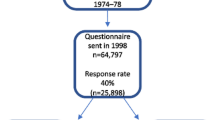Abstract.
Background:
The comparison of different health care systems is one way to give empirical evidence to health care reform and policy. The differences between health care systems in which general practitioners serve as gate keepers in comparison to systems in which patients are free to contact every physician and specialist they like are a question of high interest.
Method:
This study compares the Netherlands and Germany, two countries with very similar political, social, and health system structures, but different types of access to the health care system. While Germany offers unconstrained access to specialist ambulatory care, the Netherlands restricts health care utilization by giving primary care a ‘gate keeper’ function not allowing patients direct access to specialist care. Data from the WHO international collaborative study on psychological problems in general health care (Üstün and Sartorius 1995) were analysed with respect to pathways to care, treatment, and health status. In an initial cross-sectional assessment, in 3-month and 12-month follow-ups, contacts to physicians or hospital admission have also been monitored.
Results:
There were only marginal differences between the Dutch and the German sample in the sociodemographic characteristics as well as in the diagnostic status with respect to mental disorders. In the Netherlands, 95.5%, and in Germany, 68.8% of the patients presented their ‘reason for visit’ for the first time to any physician at this index contact with a general practitioner. During the following 3 months, 24% of the Dutch patients, but 60.2% of the German patients, additionally contacted other physicians (P < 0.001). At 12 months, this rate was 62.9% vs. 78.6% (P < 0.001). During the 12-month follow-up period, there were 15.7% hospital admissions in Germany vs. 25.4% in the Netherlands (P < 0.005).
Conclusions:
Family physicians in a gate keeper system reduce the number of contacts to other physicians and the intensity of treatment, while at the same time the rate of hospital admissions is increased.
Similar content being viewed by others
Author information
Authors and Affiliations
Corresponding author
Rights and permissions
About this article
Cite this article
Linden, M., Gothe, H. & Ormel, J. Pathways to care and psychological problems of general practice patients in a “gate keeper” and an ”open access” health care system. Soc Psychiatry Psychiatr Epidemiol 38, 690–697 (2003). https://doi.org/10.1007/s00127-003-0684-6
Accepted:
Issue Date:
DOI: https://doi.org/10.1007/s00127-003-0684-6



